Websites are a natural extension for small businesses into the digital space. Almost 40% of small businesses, however, choose not to invest in a website due to concerns about cost and relevance in 2019. Websites establish legitimacy for small businesses, and this 2019 report shows that businesses can create a basic website without significant budgetary strain.
Updated May 4, 2022
Websites are a critical part of a small business marketing strategy because of their ability to enhance legitimacy and build trust with a variety of consumers.
Websites often serve as potential customers’ impression of a company, and people rely on a digital presence to determine if a company is real and reputable.
Visual Objects surveyed 529 small businesses in 2019 about whether they have a website, why they have a website, and how they maintain their website.
Businesses can use this report to understand the importance of investing time and resources in creating a website and how to confront the challenges and costs of doing so.
For more insights on the current web strategy for small businesses, check out 2022 Data on Web Design.
Our Findings
- Most small businesses (60%) invest in a website, but 40% choose not to.
- Of the companies that do not have a website, 28% said a website is irrelevant for their business.
- Almost one-third of small businesses (30%) use their websites to drive revenue.
- Low website traffic (19%) and competition from other businesses (19%) were the most common challenges for small business websites in 2018.
- Most small businesses (52%) have in-house employees to maintain their websites. About 20% work with agencies to meet their website goals.
- Two-thirds of companies (66%) spent less than $10,000 to design, build, and launch their websites.
- More than one-third of small businesses (37%) plan to increase spending on their websites in 2019.
More Than One-Third of Small Businesses Don’t Have a Website
Most small and medium businesses have a website, but more than one-third chose not to establish one in 2019.
In 2019, about 60% of small businesses had a website: Almost half (43%) had invested in a website since before 2018, and 16% launched a website in 2018.
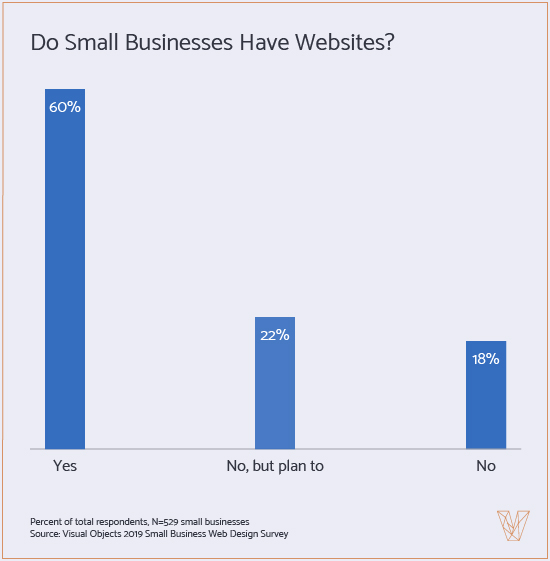
Nearly one-quarter of small businesses (22%) planned to launch a website in either 2019, 2020, or later.
Some businesses (18%), however, said they are unlikely to launch a website in the future when asked this in 2019.
This surprised Jackson Fox, user experience director at Viget, a full-service digital agency outside of Washington, D.C.
“A lot of people are trying to transact online these days,” Fox said. “It doesn’t matter if you’re Amazon or a mom-and-pop shop – More and more people want to do that transaction online, or start that transaction online, and a digital presence makes you more legitimate.”
As consumer demand grows for digital business transactions, small businesses should invest in a digital presence to compete. Websites benefit most business models, whether small businesses are selling a product or service, publishing content, or promoting an offering.
An online presence legitimizes businesses and their offerings in an age where most transactions occur online. Younger generations, such as millennials and Generation Z, are an emerging share of consumers who are more accustomed to digital experiences than generations before them.
Websites are also an invaluable tool for consumers looking for information about businesses. As business transactions become increasingly digital, small businesses should invest in websites to stay relevant and reach a wider consumer base.
Additional Reading: '2022 Small Business Advertising Report'
Businesses Without Websites Believe Websites Are Irrelevant
Of small businesses without websites, 28% choose not to create a website when this data was collected because they believe it is irrelevant for their business.
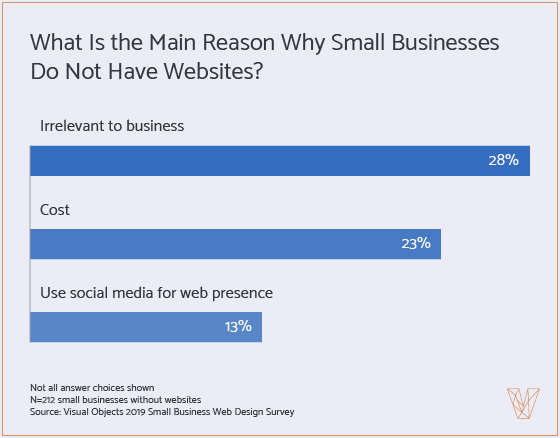
Other reasons small businesses choose not to invest in a website include cost (23%) and social media use in place of a website (13%).
Businesses that believe a website is irrelevant to their operations rely on alternative strategies to develop their brand and promote their product.
Marcos Clowes, an independent logistics and transport consultant in the United Kingdom, chose not to create a website for his business.
“I decided to build upon my existing network both face-to-face and online,” Clowes said. “I receive referrals from trusted friends and colleagues and assist the media with articles that required my areas of expertise. It generates more than enough business to ensure I don’t feel the need for a website.”

Clowes relies on “traditional,” in-person networks to promote his business. He also works with the press, answering media inquiries to build his brand as an industry expert.
Word-of-mouth networks, however, can only take businesses so far. Fox believes businesses without websites may face challenges scaling their unique marketing strategies.
“Those networks are only so big,” Fox said. “That can lead to a limited pipeline when it comes to generating new business leads. At some point, businesses get into the outer reaches of that word-of-mouth network. Without a digital presence in some way, people who don’t know you just may not trust your business.”
Fox said that websites answer questions for potential customers outside of business owners’ traditional networks.
Websites are effective at providing necessary information about companies to customers online. They also reach more consumers than word-of-mouth or other forms of marketing. It’s important for businesses to invest in that unified digital presence.
Most Businesses Spend Less Than $10,000 on Their Websites
Business websites are more affordable than ever, despite 23% of small businesses citing cost as the main reason they didn't have a company website when surveyed in 2019.
When surveyed in 2019, almost two-thirds of small businesses (65%) spent less than $10,000 to design, build, and launch their websites.

More than one-third of small businesses (37%) spent between $10,001 and $25,000, and 19% of businesses spent more than $25,000 on their company websites.
Joe Ardeeser, managing member at Jordan Crown, a web design and development agency in Seattle, believes businesses have more flexibility to create a basic website with limited financial resources or personnel.
“[If] a company is unwilling to spend more than $1,000, there are plenty of systems out there like Squarespace and Wix,” Ardeeser said. “Those kinds of systems are built for people who aren’t very technical.”
Squarespace and Wix are two popular website builders that offer user-friendly interfaces geared toward people without prior web design experience.
Squarespace, shown below, lets website builders see their edits made in real time with side-by-side viewing panes.
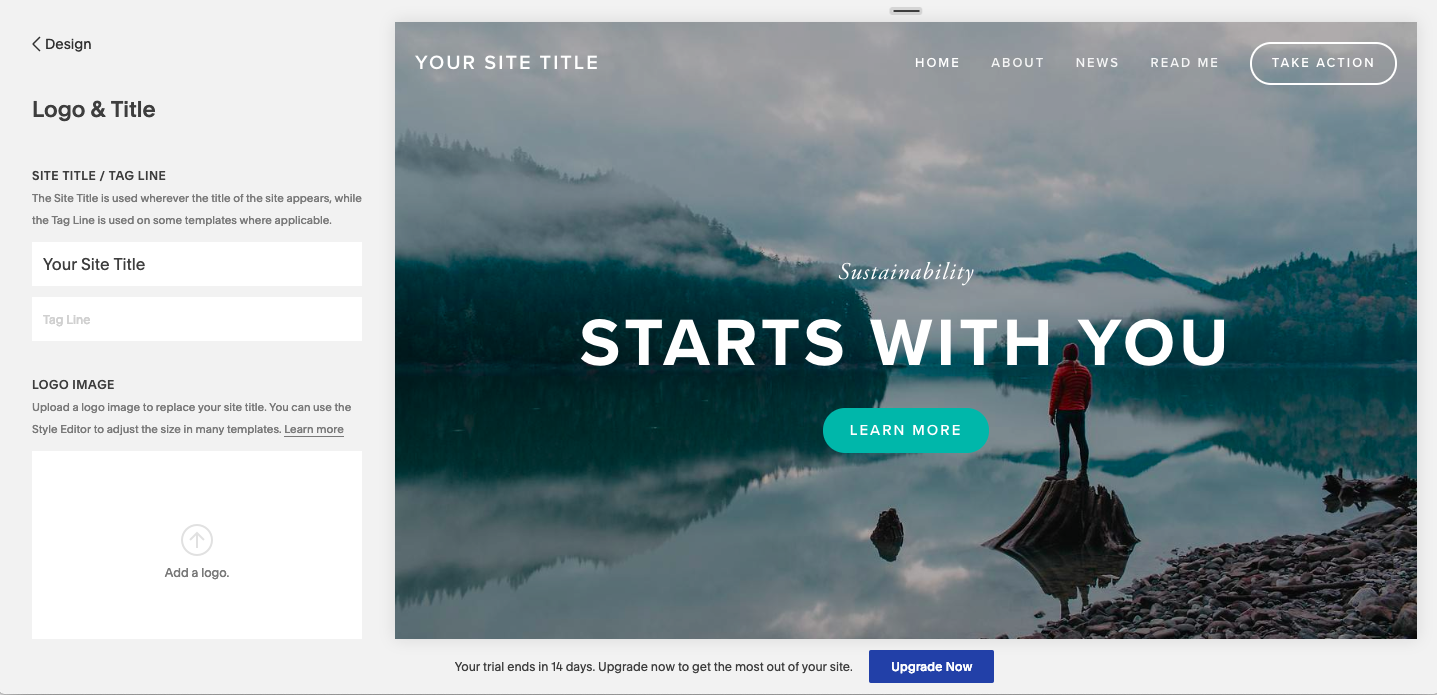
Squarespace’s high-quality user experience includes clear navigation options, structured menus, and a fast-loading interface. It is an affordable option for businesses looking to establish a basic web presence quickly.
Small businesses relying on website builders such as Squarespace, however, struggle to achieve the quality and aesthetics of the websites advertised on the platform.
Kristine Neil, owner and creative director at Vancouver, Wash.-based design firm Markon Brands, sees small businesses struggle to achieve high-quality results on website-building platforms without professional help.
“There are a thousand different DIY platforms [selling the ability to] make a website in an hour,” Neil said. “Those [platforms] really oversell and underdeliver when it comes to the lay person’s ability to execute or to recreate the samples that they’re seeing. Those [samples] are all beautiful sites, but they were all built by professionals.”
For businesses with higher budgets and more complex needs, Joe Ardeeser recommends alternative methods of website creation.
“If [businesses have] $1,000 to $3,500, I suggest working with a freelancer,” Ardeeser said. “Anything under $10,000 is going to be mostly a freelancer route, or you can find a shop that’s two or three people who can work under a $10,000 budget.”
Freelancers are an affordable option for businesses looking for added web design expertise without the price of an agency.
Many web design companies, however, work with small businesses specifically to tackle projects using the resources they have.
Online software such as Squarespace allows in-house employees with limited design experience to establish basic website functions. Meanwhile, freelancers and agencies assist small businesses that want to create custom, complex systems. Small businesses have many affordable options for creating attractive, functional websites.
Read this: '5 Wix Alternatives for Business Websites'
Almost 20% of Small Businesses Rely on Agencies to Maintain Websites
Small businesses rely on a variety of resources for website maintenance. Most use in-house employees to design and update their websites.
When surveyed in 2019, more than one-third of small businesses (39%) relied on a website builder or software, while 35% relied on freelancers or consultants, and 19% work with an agency.
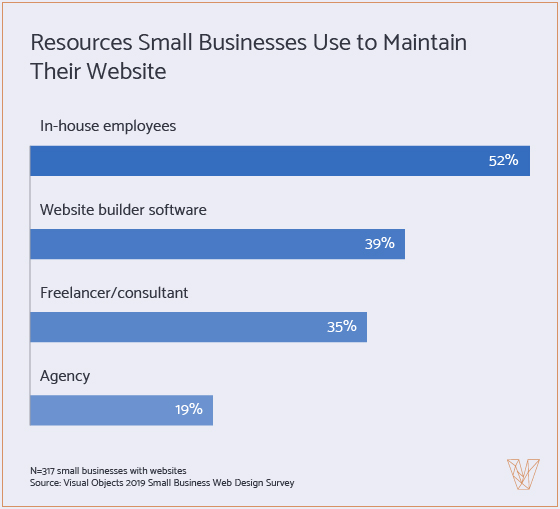
In addition, 52% of small businesses used in-house staff to help maintain their website.
Unless businesses have web design companies and web developers on staff, it can be challenging to maintain a website without the necessary expertise. More than half of survey respondents (52%) had fewer than 10 employees.
Roxana Colorado, an international business strategist at Kandula International LLC and creator of the LatinaNomad business blog, launched her first website on her own.
“When I first started, I didn't have a budget to create a website, so I had to do it [myself],” Colorado said. “The hours spent trying to figure it all out were insane ... The learning curve on the development side was huge. I would have been better off hiring someone.”
Colorado’s experience designing and building her own website underscores the trade-offs small businesses make when deciding between investing money or time in major projects.
Website maintenance often requires advanced design and development skills that in-house employees may not possess. Despite Colorado’s strategy for her website, the learning curve proved too great.
Colorado partnered with a developer to create her current website, shown below. Working with a professional web designer meant that Colorado could choose a theme and effectively address glitches.
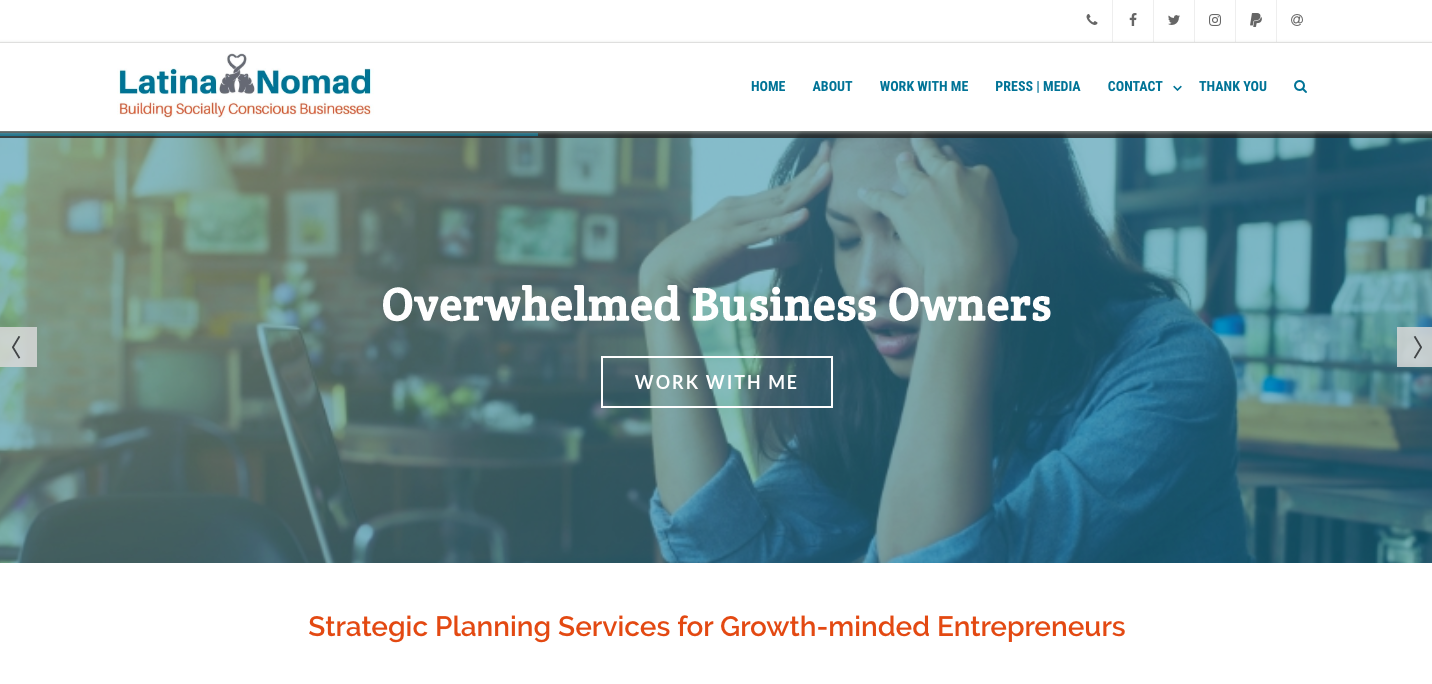
The developer created a functional, navigable website, saving Colorado from losing any more valuable time.
Website-building software still costs money and often requires time and manpower that small businesses may not have. Some agencies like Markon Brands, however, work within website builders to create beautiful products for their clients using existing frameworks.
Kristine Neil, Markon Brands' owner and creative director, primarily develops high-quality Squarespace websites for small businesses working with limited resources.
“The cool thing about working on a platform like Squarespace is we’re able to offer a high-caliber product to a client with a smaller budget,” said Neil. “We hand [clients] a website where they have some modicum of control, but they had professional help to take care of all the backend settings – the things that were a little overwhelming from a DIY standpoint.”
Squarespace and other platforms, with professional help, provide a greater ROI for small businesses with limited budgets. Agencies like Markon Brands help small businesses create a beautiful website with a high-quality UX and empower clients to manage the day-to-day aspects of website maintenance.
Although hiring a web design agency often feels daunting for small businesses looking to launch a simple website, partnering with a qualified team is a worthy investment for building an online presence.
More Than a Third of Businesses Expect Their Website Spending to Increase in 2019
Although most businesses spent less than $1,000 to launch their websites, many expect this spending to increase.
More than one-third of small businesses (37%) thought that they would increase spending on their websites in 2019 compared to 2018.
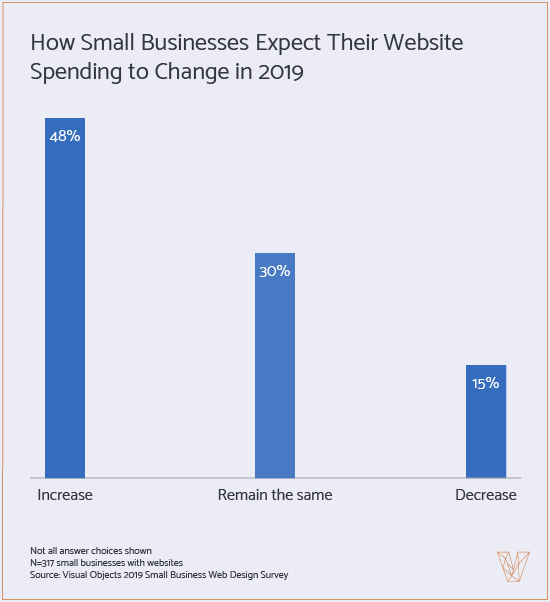
Only 15% of businesses believed their website spending would decrease, while 30% expected spending to stay the same.
After single-handedly launching a website for her business, Colorado was able to maintain it without incurring any additional costs.
“Fortunately for me, the cost remained the same,” Colorado said. “But even if the cost [had] increased, it would have been worth the value. Time is our biggest asset, and I lost a lot of time and money doing a website that didn’t deliver – time I could have invested in making money that would have covered the cost of a website designer and made a profit.”
If small businesses save money by creating and maintaining websites themselves, they risk spending another valuable resource – time – to compensate for gaps in design and development skills.
Colorado believes that there is a significant return on investment for businesses that choose to spend more and work with design and development professionals.
Web design services require an up-front investment for small businesses but have long-term benefits including a website that is easier to maintain and customized to their unique needs.
James Trumbly, founder and managing partner of HMG Creative, a full-service marketing agency in Austin, Texas, believes it is important for web design agencies to encourage their clients to maintain their own websites after the initial launch.
“We’re all about empowering our clients to be able to take ownership of their website,” Trumbly said. “We want our clients to be able to publish and manage content on their website without being tied to us as an agency to manage the day-to-day tasks of supporting the website.
Although businesses should invest money in building their websites, costs will stay steady if the website is high-quality and provides value to consumers.
Sales & Revenue Drive Businesses to Create Websites
Websites mean businesses can promote offerings and conduct transactions online. One-third of businesses (30%) use their websites to increase sales and revenue when asked in 2019.
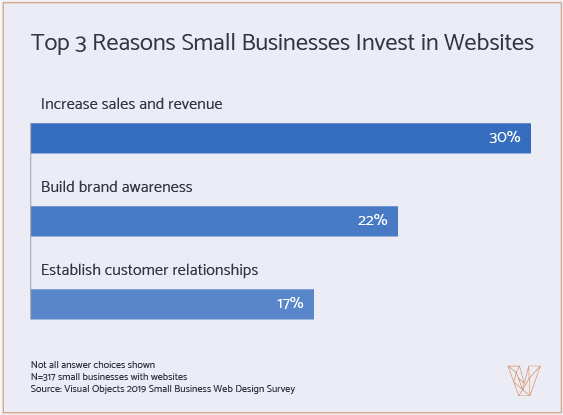
Businesses also invested in websites to establish brand awareness and authority (22%) and to build relationships with customers (17%).
Websites often achieve these three goals simultaneously. Small businesses with websites understand the importance of customer relationships and brand authority to making more sales.
“The website is a critical sales tool,” said Gerhard Karba, CEO of iXStrata, a software company in Santa Monica, Calif. “It illustrates to potential clients that you are ‘real,’ and they can easily see the services you provide. It also allows them to share your website with others.”
Karba developed iXStrata’s original website before it launched and then invested in updates to establish legitimacy with potential clients.
These top 3 reasons for establishing a website apply even outside of the technology industry. Kara Fasone, co-founder and chief wellness officer at Wise & Well Academy, a digital hub for online wellness courses and psychology-based resources, invested in a Wix website to promote her business through content marketing.
“We were faced with building an audience from scratch, so content marketing became a key part of our start-up strategy,” Fasone said. “Our company primarily provides digital products, and though we also partner with organizations to provide workplace wellness services, we needed a website to host most of our products.”
Fasone leveraged her web presence to connect with potential customers through online blogging, which then directed customers to the Wise & Well website for her product offerings.Fasone’s Wix blog, shown below, is simple and easy to navigate, putting her content front and center of the page.
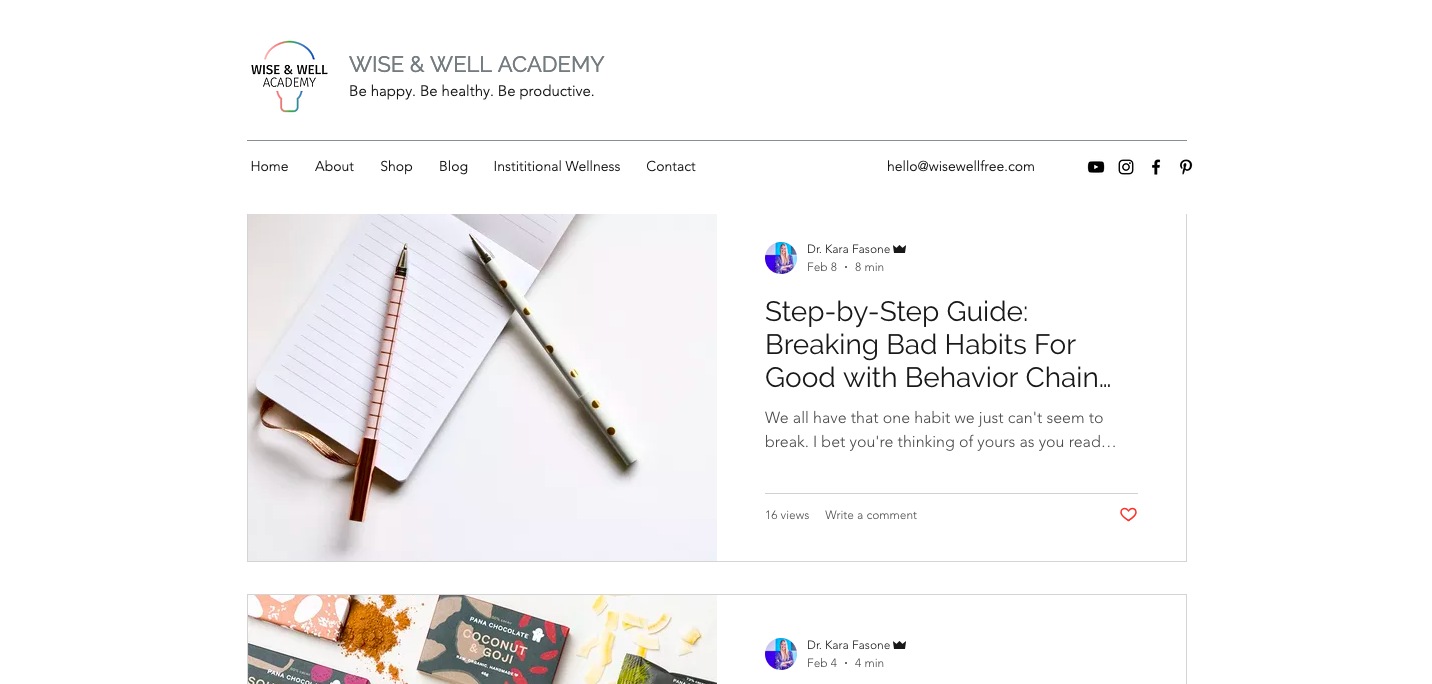
Fasone’s blog content is the focus of her website. She kept design elements minimal and used whitespace to draw readers’ attention to the articles on the page.
“Many of these blogs provide helpful but basic information, which has influenced visitors who are most interested in our services to subscribe to our email list or reach out directly about a product,” Fasone said.
Fasone drove email subscriptions and product inquiries through an investment in her company website and blog.
Websites serve multiple purposes for businesses. They establish brand authority and help businesses connect with potential customers, which in turn boosts sales and revenue.
Traffic Is a Challenge for Small Business Websites
Websites also introduce new difficulties for small businesses.
Low website traffic and competition from other businesses are among the top challenges websites face.
.jpg)
Almost one-fifth (19%) of small businesses said that low traffic and heavy competition were their biggest website challenges. Some businesses (13%) also cited a lack of time or knowledge to maintain a website as their biggest challenge when asked in 2019.
Trumbly manages the expectations of clients looking to create a website.

“A small business often thinks ‘build it and they will come…’ when it comes to their digital presence,” Trumbly said. “It’s important to talk about what happens after the initial site launch. Just because you have a website doesn’t mean it’s going to have a positive impact on your business unless you have a marketing strategy tied to it.”
Websites are valuable for businesses to make a first impression on customers, but they still need a marketing strategy to drive potential customers to their domain.
Small businesses should use websites as a part of a holistic marketing strategy in order to drive traffic and boost sales.
Websites Legitimize Small Businesses
Websites are an important tool for small businesses to establish brand authority and connect with customers. While, in 2022, many companies have realized the importance of having a website in this digital landscape. That wasn't the case when asked years earlier.
When surveyed in 2019, more than one-third of small businesses, however, didn't invest in a company website. These business owners say websites are irrelevant to their business, but a marketing strategy without a website is limited in scale.
Some small businesses have concerns about the cost of launching and maintaining a website, but most businesses spent less than $1,000 to do so.
About one in five small businesses worked with an agency to maintain their website, but more than half of businesses relied on internal employees to do the complex work.
Increased sales and revenue was the top reason why small businesses choose to establish and maintain websites. Websites provide a single digital location to answer customer questions and display products and services. Building traffic remains a challenge for many companies, but when businesses use websites in conjunction with a holistic digital marketing strategy, traffic increases.
Qualified web design agencies are a worthy investment for businesses looking to build, maintain, or improve their websites. They can help identify and solve complex problems and establish brand authority online.
Ready to take the plunge with a brand new website? Hire a web design agency for support.
About the Survey
Visual Objects surveyed 529 small business owners and managers with between 1 and 500 employees across the U.S.
More than half of small businesses (54%) have between 1 and 10 employees, and 46% have between 11 and 500 employees.
Most respondents are male (52%), and 48% of respondents are female.
Millennials (ages 18-34) make up 29% of respondents, 45% are Generation Xers (ages 35-54),and 27% of respondents are baby boomers (ages 55+).